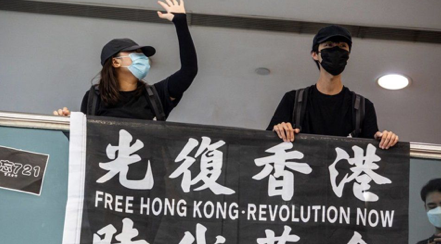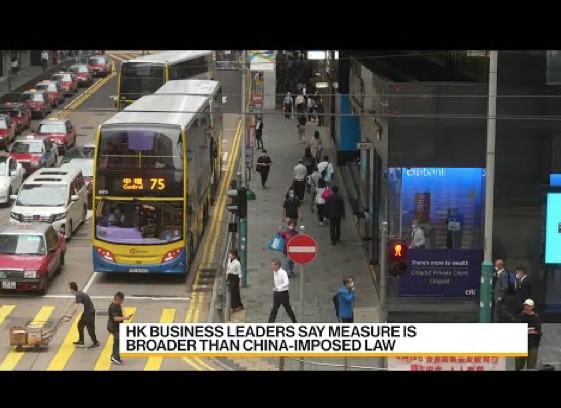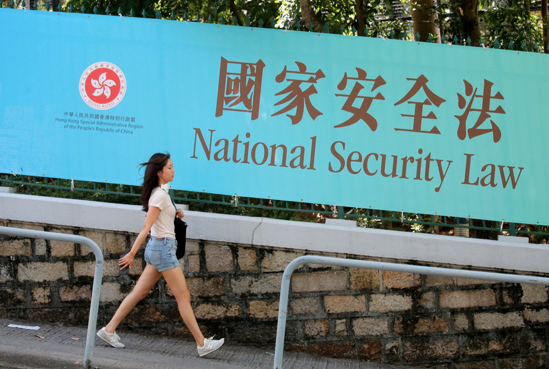The Hong Kong National Security Law (NSL), officially the Law of the People’s Republic of China on Safeguarding National Security in the Hong Kong Special Administrative Region, was passed in June 2020 by the National People’s Congress. The legislation was a result of year-long protest action, which fractured society, and in many people’s view brought Hong Kong close to anarchy.
Starting with protests in 2019 over the proposed passing of an extradition bill to enable extradition from HK to other territories (including the mainland) and evolved into a struggle for democratic rights for Hong Kong Citizens, without interference from China.

Photo: AFP
The resulting National Security Law(NSL) was passed to quell the protest, prevent foreign interference and maintain law and order in HK. In essence, focusing on crimes of secession, subversion, terrorism and collusion with foreign organizations. Any open speech or verbal intention of Hong Kong’s secession from China was considered a crime with the right for authorities to surveil, detain and search persons and further requiring publishers and internet services to remove content which is deemed a violation of the law. The strict implementation of the law ensured China’s control over HK and brought an end to the protests.
This has been followed by the recent passing in the HK legislature of Article 23 which guarantees the ‘one country, two systems’ framework by prohibiting acts that threaten the security of the Central People’s Government.
Article 23 extended the definition of offences and penalties set out by the NSL , including life imprisonment for crimes such as treason and insurrection, including detention without charge for up to two weeks and will extend existing criminal offences and incorporate anti-espionage offences. Due to the potential interpretation of the laws, this impacts individuals, religious organizations, global corporations and the region’s judicial independence, as the local government aligns with the Chinese Communist Party’s National Security agenda.
Both sets of legislation drew worldwide criticism, although similar laws can be found throughout Western democratic countries – although perhaps not as broad. The United Kingdom and USA amongst other countries strongly condemned the National Security Law as a breach of the 1984 Sino-British Joint Declaration, which provided autonomy for Hong Kong to be retained for 50 years. The outcome was ‘relaxed immigration laws; for Hong Kong migrants by countries such as Australia, Canada, the United Kingdom and the United States, resulting in a massive exodus of mainly the younger and well-educated. This has continued to affect the business and social environment, impacting its success as an international hub and leaving a population struggling to seek its identity.
Political Impact
The initial impact of the NSL was the sudden flight of democratic activists such as Joshua Wong, Nathan Law, Agnes Chow and the dismantling of organizations such as Demosistō, which had been involved in lobbying in the US for the passing of the Hong Kong Human Rights and Democracy Act. Though the law was not retrospective, a Hong Kong student speaking to Asia Thinkers, feared the law could still apply and deleted his social media posts commenting that “he knew of many others who had done the same”.
The long-term impact on the Hong Kong political landscape has been the Chinese Government’s willingness to use the National Security Law to silence dissent and eliminate political opposition, disqualifying pro-democracy candidates from running in elections and removing lawmakers who publicly opposed the law. In 2023, new election rules set by Chief Executive Lee reduced the number of directly elected representatives from 90 per cent to 20 per cent of the total council seats. The remaining seats must be appointed by the chief executive or indirectly appointed by an electoral college. Due to broad dissatisfaction with the new restrictions, voter turnout for the 2023 district council elections plummeted to 27.5 per cent of eligible voters, compared to 71 per cent in the 2019 election.
The law has also given Beijing the broad powers to punish critics, fundamentally altering life for Hong Kongers and leading to a loss of autonomy and free speech. Whilst in some cases there were clear breaches of public order, especially during demonstrations, some critics believe other prosecutions undertaken can be seen as an effort to punish those speaking out against China and exercising democratic rights. As of July 2023, police had arrested at least 260 people under the law, many of them prominent pro-democracy activists former lawmakers, and journalists. Thousands more people have been arrested for participating in the 2019 protests. Beijing and the Hong Kong government have also curbed media freedoms with pro-democracy publications such as the newspaper Apple Daily closing after journalists were harassed and jailed.
The crackdowns have begun to extend to foreigners working in Hong Kong. A Chinese Canadian scholar researching the consequences of the Chinese government’s 1989 massacre of protesters at Tiananmen Square was recently fired from her teaching position at a Hong Kong university after being denied a work visa. These moves have by and large ended mass public protests and silenced the many Hong Kong residents who fought for democracy.
The law has also raised concerns about the erosion of judicial autonomy, as the Chief Executive can appoint judges to handle National Security cases, and decisions made by the Committee for Safeguarding National Security are not subject to review by the courts. A national security division within the Hong Kong Police Force established in 2020 can conduct covert surveillance without judicial oversight, potentially undermining human rights protections.

Photo :Reuters
Social Impact
The result has been a population who have been stunned into silence, with media afraid to enter into political discussions or challenge the status quo. It was a sudden and brutal change in a society unused to such close government scrutiny. As one Old China Hand commented, “How change was introduced was a PR disaster, giving citizens no time to come to terms with the NSL.”
Hong Kong citizens began looking for ways to emigrate, feeling that the law would fundamentally damage their rights of expression and freedom. Approximately 89,000 have left so far resulting in a 1.2% drop in Population. One of the unintended positive consequences of the departure of young professionals is that Hong Kong youth have the opportunity to fill these vacancies. One recent graduate commented “that there were more places available at University and if an applicant had the right qualifications and the required language standard, there were better employment opportunities available than previously.
School enrollment for Government schools has shrunk as parents fearing patriotic education, moved them to private schools in HK or overseas. It is well documented that NSL has had a significant impact on education, leading to a suppression of academic freedom. The law has blurred the boundaries between teachers’ professional and personal lives, leading to self-censorship and sanctions for expressing dissenting views. The law has also affected students, with concerns about surveillance in online classrooms and the potential consequences of expressing dissenting views. This has led to changes in the curriculum, with the Education Bureau ordering schools to review and remove items that violate the law. Overall, the NSL has created a climate of fear and self-censorship in educational institutions in Hong Kong.
Article 23 has been criticized for being dangerously vague and broad, with virtually anything being deemed a threat to National Security. The new legislation replicates vague terms such as ‘political groups’ and ‘establishing ties with foreign political organizations’.
Religious organizations fear they will be targeted similar to the action taken against them in the PRC, having seen the Catholic Church cut its ties with the Vatican and lose its freedom of worship. The Church has been vocal in its condemnation of NSL pushing them to become core supporters of the anti-Article 23 movement.
Impact on Business
The National Security Law imposed on Hong Kong by China has had a significant impact on the city’s economy and its position as a global financial hub. The law has raised concerns from International businesses about the erosion of Hong Kong’s autonomy, its status as a global financial hub, and its ability to maintain its high degree of economic freedom and continue its reliable legal system based on British common law. The overseas business community especially has reservations about how new rules concerning “state secrets” could affect the international financial hub’s competitiveness and ease of doing business. The new legislation allows the government to criminalize activities that have been accepted in Hong Kong for a long time, such as building ties between local and foreign political organizations or bodies, which might now be considered as undermining the Central People’s Government.
Companies with long-standing relationships in Hong Kong have continued to voice concerns about the National Security Law, criticizing the broad powers given to mainland authorities. The Biden administration has cautioned that companies could violate the vague National Security Law without realizing it. The number of American companies with regional bases in Hong Kong fell to an eighteen-year low in 2021. Social media companies, in particular, have expressed unease about a part of the law that requires them to surrender requested user data to the Hong Kong government. Even TikTok, an app owned by mainland-based company Byte Dance, suspended operations in the city. Many believe the law has the potential to undermine Hong Kong’s status as a global financial hub, as it may lead to a decrease in foreign investment and a loss of its competitive edge.
An immigration lawyer contacted by Asia Thinkers said that HK is in need of professionals in all areas following the brain drain, but the process to get government approval to employ overseas professionals is lengthy, and in many cases takes over 3 months, thus deterring many overseas applicants. The degradation of judicial independence in Hong Kong has already incentivized many global investors to move their offices elsewhere, like Singapore. The new National Security legislation may only further drive international business groups away from recognizing Hong Kong as a low-risk hub for investment.
Asia Thinkers spoke with a HK journalist who commented: “There is no arguing against the need for the legislation, which Hong Kong is constitutionally obliged to enact. What is a matter of contention, especially for China’s critics, is the speed at which it is being pushed through the legislature amid concerns that it should have enough protections built in to safeguard existing rights and freedoms.”
Former chief executive, Leung Chun-ying has commented that the government needed to thoroughly explain Article 23 to international firms and convince them that Hong Kong was a good base from which to enter the mainland Chinese market.

The Future
Despite concerns, some argue that the NSL is designed to protect the interests and prosperity of Hong Kong by ensuring that the city remains stable and secure. The law has also boosted the mutual trust between Hong Kong and the Mainland, allowing the city to better integrate into the country’s development. As one Ex Government official said, “With China’s backing HK’s economy can grow even stronger than under UK rule”.
Some business leaders believe that Hong Kong can maintain its commercial status despite its democratic decline. In recent years, Beijing has moved to connect Hong Kong more to the Mainland, creating the Greater Bay Area project, an ambitious plan to integrate Hong Kong and cities in neighbouring Guangdong Province into a more cohesive economic region, with a view to becoming an Asian economic powerhouse. Many local firms and investors are betting that with China’s support, this increased connectivity will boost the amount of wealth flowing from the Mainland into Hong Kong. According to recent reports, more than 1.2 million Chinese travellers visited Hong Kong during the eight-day Lunar New Year festival in 2024. The largest number to have visited during this holiday period.
A member of one of business the Business Chambers commented “that they are starting to see more mainland companies registering in HK and increased cooperation with Macau and Guangdong businesses. They are coming to HK for expertise, connections and international market access.”
Overall, the NSL has significantly altered the political and legal landscape in Hong Kong, leading to a crackdown on dissent and personal freedoms, and concerns about the erosion of judicial independence and human rights. On the other hand, many welcome the return of law and order and economic stability. Although HK will continue to suffer as a financial hub as businesses way up the risks, the reality is that with the long-term economic support of China and the HK people’s resilience to manage change, Hong Kong may well defy its critics and again further develop its prosperity as part of the Greater Bay economic zone.

